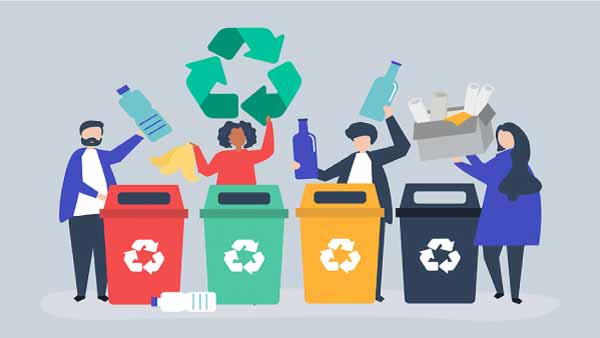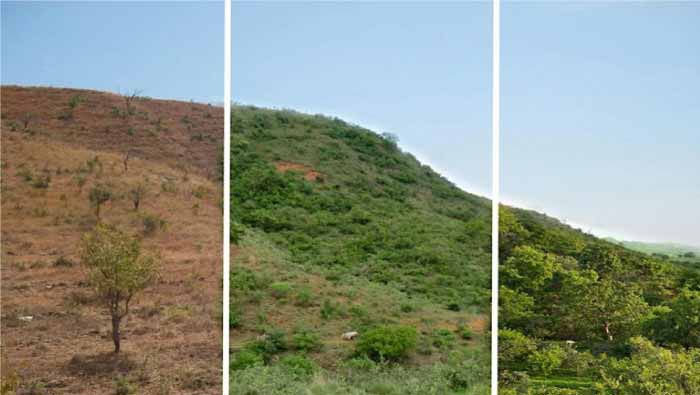Waste management is the set of activities and techniques aimed at efficiently managing waste generated by human activity, with the aim of minimizing its impact on the environment and public health.
The main stages of waste management are:
Waste generation: This stage includes the production of waste in homes, companies, industries, hospitals, among others.
Collection: It is the phase in which waste is collected from the places where it is generated and transferred to the places of treatment and final disposal.
Transport: It is the stage in which the waste is transferred from the place of generation to the place of treatment and final disposal.
Treatment: In this phase, the waste is processed to reduce its volume, eliminate its danger or recover its content.
Final disposal: It is the stage in which waste is placed in a specific place, such as landfills, landfills or incinerators.
Waste management must be carried out responsibly and sustainably, using clean technologies and respecting current environmental and health regulations. Minimizing waste through reduction, reuse and recycling is a key goal in modern waste management.
Waste generation
Waste generation is the process by which waste is produced that must be properly managed to minimize its environmental and health impact. This waste can be of different types and origin, such as municipal waste, industrial waste, construction and demolition waste, sanitary waste, among others.
Urban waste is generated in homes, businesses and public services, such as food waste, paper, cardboard, plastics, glass, textiles, etc. This waste can be treated and recovered through selective separation, collection and recycling, contributing to the reduction of waste volume and the conservation of natural resources.
Industrial waste is waste generated by economic activities, such as waste from food production, chemicals, metals, textiles, among others. This waste can be hazardous or non-hazardous, and must be managed properly to avoid its impact on the environment and health.
Construction and demolition waste is that produced in works and reforms, such as rubble, wood, glass, metals, among others. This waste can be recovered through selective separation and recycling, reducing its impact on the environment and allowing its reuse in the construction of new infrastructure.
Sanitary waste is that generated by health services, such as syringes, bandages, cottons, gloves, among others. This waste is potentially hazardous to public health and must be managed appropriately, through selective separation, treatment and final disposal in authorised places.
Gathering
Waste collection is the phase in which the waste generated in the different places of origin is collected, such as homes, companies, shops, industries, hospitals, among others, for its subsequent treatment and final disposal.
It can be carried out by public or private companies and can be carried out through different systems, such as home collection, selective collection, door-to-door collection, among others.
Home collection is the collection of waste in homes, shops and public services, through the use of collection trucks and personnel specialized in waste handling. It is important that waste is separated correctly, in accordance with local regulations, to facilitate further treatment and disposal.
Selective collection is a system in which waste is separated into different containers according to its nature, such as glass, paper, cardboard, plastic containers, among others. This form of collection facilitates the subsequent treatment and recovery of waste, which can contribute to reducing its environmental impact.
Door-to-door collection is a system in which waste is collected at the home of citizens, prior notice, and is carried out by a vehicle specialized in waste handling. This collection system can be used in areas of difficult access or in areas of low population density.
It is important that collection is carried out regularly and efficiently, to avoid the accumulation of waste and possible impacts on public health and the environment.
Transport
The transport of waste is a fundamental stage in waste management, since it is the phase in which waste is transferred from the places of generation to the places of treatment and final disposal.
The transport of waste can be carried out by public or private companies, and must comply with local and national regulations on the transport of waste, as well as with safety and environmental protection requirements.
It is important that the transport is carried out in vehicles suitable for the handling of waste, such as special trucks, containers, among others, and that the established routes are followed to avoid possible impacts on public health and the environment.
In addition, it is important that waste is transported separately and classified according to its nature and dangerousness, to avoid possible mixtures that may generate environmental and health risks.
It is essential that transport is carried out efficiently, to avoid long waiting times and reduce transport costs, and that it is carried out at appropriate times to avoid negative impacts on mobility and the quality of life of citizens.
Treatment
Waste treatment is the phase in which techniques and processes are applied to transform waste into reusable materials, reduce their volume and minimize their environmental impact.
There are different types of waste treatment, which vary according to the type of waste, its composition and its hazardousness. Some of the most commonly used techniques are:
Mechanical-biological treatment: it is a process in which waste is subjected to processes of selection, classification and biological treatment, with the aim of recovering recyclable materials and reducing the volume of waste.
Incineration: it is a process of controlled combustion of waste, which allows to reduce its volume and transform it into ashes and gases. This process is mainly used for hazardous waste, such as sanitary or chemical waste.
Composting: it is a biological process in which organic waste is decomposed by microorganisms, generating a product called compost, which can be used as fertilizer in agriculture.
Recycling: is the process of recovering materials from waste, such as plastics, glass, metals, paper and cardboard, with the aim of reintroducing them into the production chain.
Controlled discharge: is the final disposal of waste in a specific place, complying with regulations and environmental and health safety measures.
It is important to note that the choice of appropriate waste treatment depends on several factors, such as the type of waste, the amount and degree of hazardousness, and must be carried out responsibly and sustainably to minimize environmental impact and protect public health.
Final disposal of Waste Management
Final disposal is the last phase in waste management, in which waste that cannot be treated or recycled is disposed of in a safe and controlled manner.
The final disposal of waste is carried out in specific facilities, such as landfills, landfills or incineration plants, and must comply with local and national waste management regulations as well as environmental and health safety requirements.
The choice of the appropriate final disposal facility depends on the type of waste, its hazardousness and the amount of waste to be disposed of. For example, hazardous waste requires special facilities to ensure its proper disposal without putting public health and the environment at risk.
Importantly, final waste disposal must be carried out responsibly and sustainably, and measures must be implemented to minimize environmental impacts and to reduce the amount of waste sent to final disposal. This can be achieved by implementing waste reduction policies at source, promoting the circular economy and incentivizing recycling and material recovery.
Other stages of Waste Management
In addition to the stages of generation, collection, transport, treatment and final disposal, there are other important stages in waste management, which are:
Education and awareness: the education and awareness of the population is essential to promote the care of the environment and the reduction of waste at source. Education and awareness campaigns can include activities such as talks, workshops, events and communication programs in different media.
Comprehensive planning and management: comprehensive waste planning and management is key to efficient and sustainable management. This includes the definition of waste management policies, strategies and plans at local and national levels, the implementation of measures for waste reduction at source, and coordination between the different stages of waste management.
Monitoring and control: Monitoring and control of waste management is important to ensure compliance with environmental and health safety regulations and measures, and to evaluate the effectiveness of the policies and strategies implemented.
Research and development: Research and development of new waste management technologies and processes is essential to improve the efficiency and sustainability of waste management, and to reduce its environmental and health impact.
In summary, waste management is a complex and multifaceted process that involves several interconnected stages, and requires the cooperation and commitment of all actors involved to achieve sustainable and responsible waste management.


